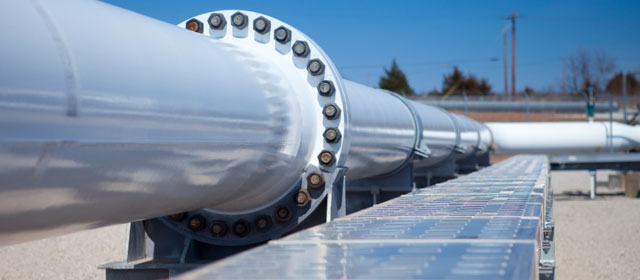Lauren Krugel
TransCanada's already hefty North American natural gas pipeline footprint is poised to get even bigger with a US$13-billion deal to buy Columbia Pipeline Group.
Columbia operates a 24,000-kilometre pipeline network that stretches from New York to the Gulf of Mexico, tapping into prolific shale gas deposits in the northeastern United States.
The deal is expected to close in the second half of this year. Once it does, TransCanada will control a 91,000-kilometre gas pipeline system that stretches throughout the continent.
"The acquisition of Columbia Pipeline Group is a rare, attractive opportunity that will create one of North America's largest regulated natural gas transmission businesses," said TransCanada CEO Russ Girling.
The deal, which includes the assumption of US$2.8 billion in debt, would get TransCanada a foothold in the Appalachian Basin, complementing the big presence it already has in Western Canada.
"With this acquisition, we believe we've secured an incumbency position in North America's two fastest-growing natural gas basins," said Girling.
"We believe that these two basins have the lowest development and production costs and the highest growth prospects in North America. We believe that will lead to additional material growth opportunities not only through the end of the decade but for very many more years to come."
Through the deal, TransCanada is snapping up assets in the Marcellus and Utica shale gas formations.
"The Marcellus shale, in particular, is one of the world's great gas resources," said Samir Kayande, an analyst at RS Energy Group.
With a natural gas prices at US$2 per 1,000 cubic feet, producers in the region aren't making money these days.
But Kayande said if prices were to rise to US$3, activity would pick up substantially — a long-term view likely shared by TransCanada.
"It's inconceivable that gas prices will not at some point rise to the point where Appalachian drilling is economic again," said Kayande.
To help pay for the acquisition, TransCanada has reached a deal with a syndicate of underwriters led by RBC Capital Markets and TD Securities to raise about C$4.2 billion in equity financing.
It's also aiming to sell U.S. Northeast merchant power assets and its minority interest in a Mexican natural gas pipeline business. In the interim, it has US$10.3 billion in bridge term-loan credit facilities.
TransCanada has made headlines in recent years with attempts to build new crude oil pipelines like Keystone XL and Energy East.
U.S. President Barack Obama nixed Keystone XL in November following a seven-year regulatory saga. National Energy Board hearings have not yet begun into the Alberta-to-Atlantic Energy East proposal, which has been facing mounting opposition from environmental groups and some Quebec politicians.


Comments